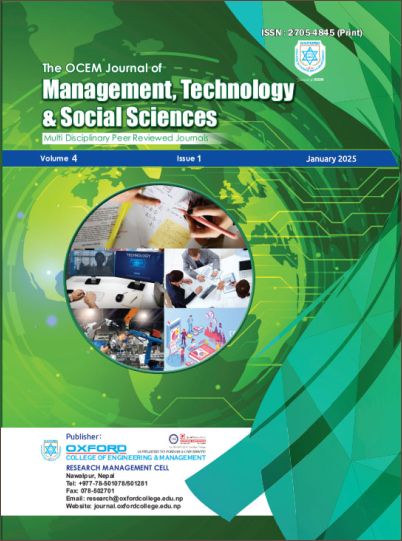Understanding Student Disability and Implementation of Inclusive Education in Nepal and Brazil
DOI:
https://doi.org/10.3126/ocemjmtss.v4i1.74740Keywords:
Challenges, differentiated instruction, inclusive education, Nepal and Brazil, student disabilities, universal design for learningAbstract
This study examines the legislative framework that governs disability rights and the implementation of inclusive education practices in Nepal and Brazil. This study’s objectives were to review journal articles on student disabilities and the challenges of inclusive education; assess the disability laws of both countries; compare their policies; analyse the laws; evaluate the opportunities and challenges of implementing inclusive education; integrate the findings from both countries; and to identify research gaps in the implementation of inclusive education at the school and higher education level institutions. In order to bring the literature to the fore, this study employed the literature review method. The findings reveal marked differences in the implementation of inclusive education between Nepal and Brazil. Moreover, our findings indicate that implementing disability laws and policies in both countries is inadequate.
Nepal and Brazil are confronted with the challenge of allocating sufficient financial and material resources to ensure the effective implementation of inclusive education. Furthermore, discrepancies between policy and practice pose an additional obstacle to the effective implementation of inclusive education. Our study also briefly highlights that implementing inclusive education is essential for promoting human rights and sustainable development, as it supports the inclusion and empowerment of students with a range of learning needs, including those with disabilities. The implication of this study benefit to scholars of both countries. We also recommend that two critical teaching approaches Universal Design for Learning and Differentiated Instruction are effective strategies for addressing the diverse needs of students and fostering an inclusive educational environment.
Downloads
Downloads
Published
How to Cite
Issue
Section
License
Copyright (c) 2025 Authors and OCEM Journal of Management, Technology & Social Sciences

This work is licensed under a Creative Commons Attribution-NonCommercial 4.0 International License.
This license enables reusers to distribute, remix, adapt, and build upon the material in any medium or format for noncommercial purposes only, and only so long as attribution is given to the creator.




